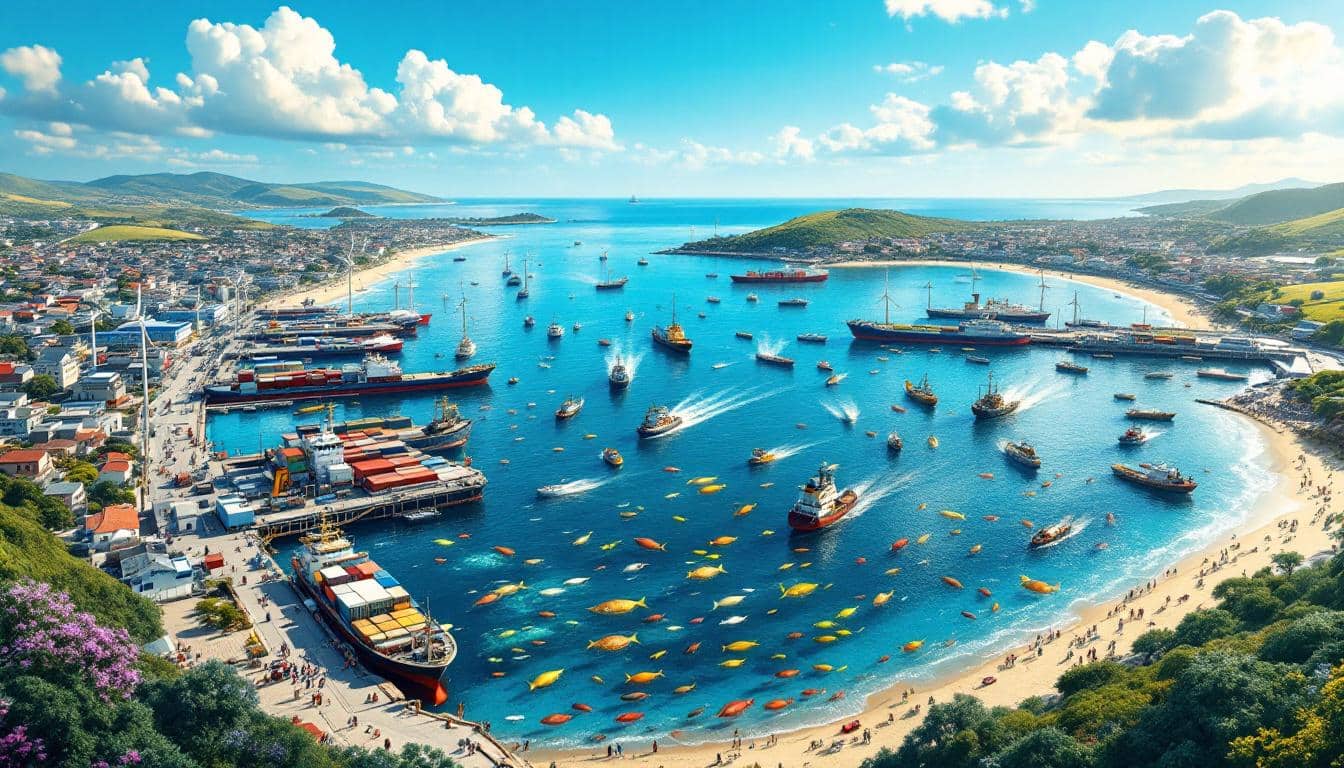Welcome to the digital universe where every click counts. Your online experience is carefully orchestrated. Behind every visited page lie sophisticated technologies.
Websites use cookies and personal data to optimize their services. These tools help to track outages and to protect against spam, fraud, and abuse. Furthermore, they measure public engagement and site statistics to better understand service usage and improve their quality. Depending on your preferences, the choice to accept or decline certain cookies influences the personalization of content and advertisements presented to you.

“`html
The blue economy represents a major opportunity for sustainable development, responsibly exploiting marine resources while stimulating innovation and economic growth. However, this expansion is accompanied by increasing conflict issues that require effective mitigation strategies to ensure a balance between exploitation and preservation of marine ecosystems.
Table of Contents
ToggleWhat are the main growth factors of the blue economy?
The blue economy is experiencing rapid growth due to several key factors. Technological innovation plays a central role, notably with the development of new marine technologies that enhance the efficiency of activities such as fishing, aquaculture, and offshore energy exploitation. Additionally, the increasing global demand for renewable resources, such as offshore wind energy and green hydrogen, is driving investments in this sector.
Moreover, the growing awareness of environmental issues is pushing governments and businesses to adopt more sustainable practices. Initiatives such as a deeper understanding of the blue economy and its opportunities for marine sustainability encourage research and development of innovative solutions.
What are the main emerging conflicts in the blue economy?
With the expansion of the blue economy, several conflicts are emerging, primarily related to competition for access to marine resources. Industrial fishing, for example, competes with aquaculture initiatives, creating tensions between different economic actors. Aquaculture can also impact natural habitats, threatening biodiversity and causing disagreements with local communities and environmentalists.
Another major conflict concerns energy exploitation at sea, particularly offshore wind projects and oil drilling. These activities can lead to significant environmental impacts, such as noise pollution and disruption of marine ecosystems, generating opposition from NGOs and local residents. Furthermore, the management of maritime spaces becomes complex with the increase of competing activities, requiring rigorous coordination among the various stakeholders.
What are the effective mitigation strategies in response to these conflicts?
To resolve conflicts in the blue economy, several mitigation strategies can be implemented. The first is to promote integrated maritime governance, involving collaboration among governments, businesses, scientists, and local communities. This approach allows for the development of balanced regulations that take into account economic needs while protecting marine ecosystems.
Next, adopting sustainable practices is essential. For example, sustainable aquaculture that minimizes environmental impacts and maximizes social benefits can reduce tensions with other marine resource users. Likewise, energy projects should integrate rigorous environmental impact studies and adopt less intrusive technologies to limit their ecological footprint.
Moreover, technological innovation plays a crucial role in conflict resolution. Innovative solutions, such as advanced monitoring systems and resource management technologies, can help prevent overuse and ensure equitable exploitation of marine resources.
What role does international cooperation play in the development of the blue economy?
International cooperation is a key element for the success of the blue economy. Maritime issues transcend national borders, making global collaboration essential for sustainable resource management. International agreements, such as the United Nations Convention on the Law of the Sea (UNCLOS), establish legal frameworks for the management of maritime spaces and the protection of the marine environment.
Furthermore, partnerships between countries can promote knowledge and technology sharing, thereby accelerating innovation and the implementation of sustainable practices. Joint initiatives also allow for the coordination of conservation efforts and prevention of conflicts related to the use of marine resources.
How do education and awareness contribute to a harmonious blue economy?
Education and awareness are essential for promoting a thorough understanding of the challenges and opportunities related to the blue economy. By informing the public and stakeholders about the impacts of their actions, it is possible to encourage more responsible and sustainable behaviors. Educational programs, awareness campaigns, and participatory workshops can help build consensus around sustainability goals.
Moreover, involving local communities in decision-making and resource management enhances the sense of belonging and collective responsibility. This helps to reduce conflicts and promote equitable and sustainable use of marine resources.
What are some examples of successes in implementing the blue economy?
Several initiatives demonstrate the effectiveness of strategies implemented to develop a sustainable blue economy. For instance, offshore renewable energy projects have succeeded in combining clean energy production with habitat preservation through advanced technologies and environmentally friendly practices.
Another notable example is the development of sustainable aquaculture, which has met the growing demand for seafood while reducing pressure on wild fish stocks. Initiatives such as innovative aquaculture farms integrate resource recycling systems and eco-friendly production methods, thereby contributing to the protection of marine ecosystems.
Finally, international cooperation in managing Marine Protected Areas (MPAs) has helped conserve critical habitats and promote biodiversity. These joint efforts demonstrate that collaborative and well-planned solutions can lead to positive outcomes for the blue economy and the environment.
What are the future challenges for the blue economy?
As the blue economy continues to grow, new challenges are emerging that require constant attention. One of the main challenges is managing the impacts of climate change on marine ecosystems, which can affect the productivity of resources and the viability of maritime industries. Adapting infrastructure and management practices to changing climate conditions is essential for ensuring the resilience of the blue economy.
Furthermore, regulating and governing new marine technologies raise complex questions related to security, intellectual property, and fairness. It is crucial to develop flexible and inclusive regulatory frameworks that can quickly adapt to technological changes and ensure fair distribution of benefits.
Finally, financing remains a major issue. Although many blue economy projects are promising, they require significant investments to transition from the development phase to large-scale implementation. Encouraging both private and public investments, as well as public-private partnerships, is essential to support the sustainable growth of the blue economy.
In conclusion, the blue economy offers exciting prospects for the future, but it requires careful management of emerging conflicts and challenges. By adopting effective mitigation strategies, fostering international cooperation, and investing in innovation and education, it is possible to develop a prosperous and sustainable maritime economy that benefits both the economy and the environment.
Learn more about the blue economy
To deepen your knowledge about the blue economy and its challenges, consult the following articles:
- How can aquaculture redefine the seaside tourism experience?
- Francisca Pardo: explorations in blue economy and maritime policy
- Leena Srivastava, an expert in energy and blue economy
- How can blue technologies transform our aquatic future?
- Understanding the blue economy: challenges and opportunities for marine sustainability
L’économie bleue du #Maroc doit devenir plus résiliente face au climat pour assurer une croissance durable, notamment dans le tourisme côtier. D'ici 2030, la Méditerranée pourrait devenir trop chaude pour le tourisme.
— World Bank MENA (@WorldBankMENA) October 4, 2024
Blog : https://t.co/myShM6Ioxs









